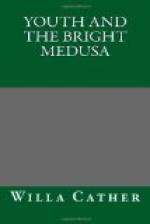III
Late one afternoon in the winter of 189-, Cressida and I were walking in Central Park after the first heavy storm of the year. The snow had been falling thickly all the night before, and all day, until about four o’clock. Then the air grew much warmer and the sky cleared. Overhead it was a soft, rainy blue, and to the west a smoky gold. All around the horizon everything became misty and silvery; even the big, brutal buildings looked like pale violet water-colours on a silver ground. Under the elm trees along the Mall the air was purple as wisterias. The sheep-field, toward Broadway, was smooth and white, with a thin gold wash over it. At five o’clock the carriage came for us, but Cressida sent the driver home to the Tenth Street house with the message that she would dine uptown, and that Horace and Mr. Poppas were not to wait for her. As the horses trotted away we turned up the Mall.
“I won’t go indoors this evening for any one,” Cressida declared. “Not while the sky is like that. Now we will go back to the laurel wood. They are so black, over the snow, that I could cry for joy. I don’t know when I’ve felt so care-free as I feel tonight. Country winter, country stars—they always make me think of Charley Wilton.”
She was singing twice a week, sometimes oftener, at the Metropolitan that season, quite at the flood-tide of her powers, and so enmeshed in operatic routine that to be walking in the park at an unaccustomed hour, unattended by one of the men of her entourage, seemed adventurous. As we strolled along the little paths among the snow banks and the bronze laurel bushes, she kept going back to my poor young cousin, dead so long. “Things happen out of season. That’s the worst of living. It was untimely for both of us, and yet,” she sighed softly, “since he had to die, I’m not sorry. There was one beautifully happy year, though we were so poor, and it gave him—something! It would have been too hard if he’d had to miss everything.” (I remember her simplicity, which never changed any more than winter or Ohio change.) “Yes,” she went on, “I always feel very tenderly about Charley. I believe I’d do the same thing right over again, even knowing all that had to come after. If I were nineteen tonight, I’d rather go sleigh-riding with Charley Wilton than anything else I’ve ever done.”




